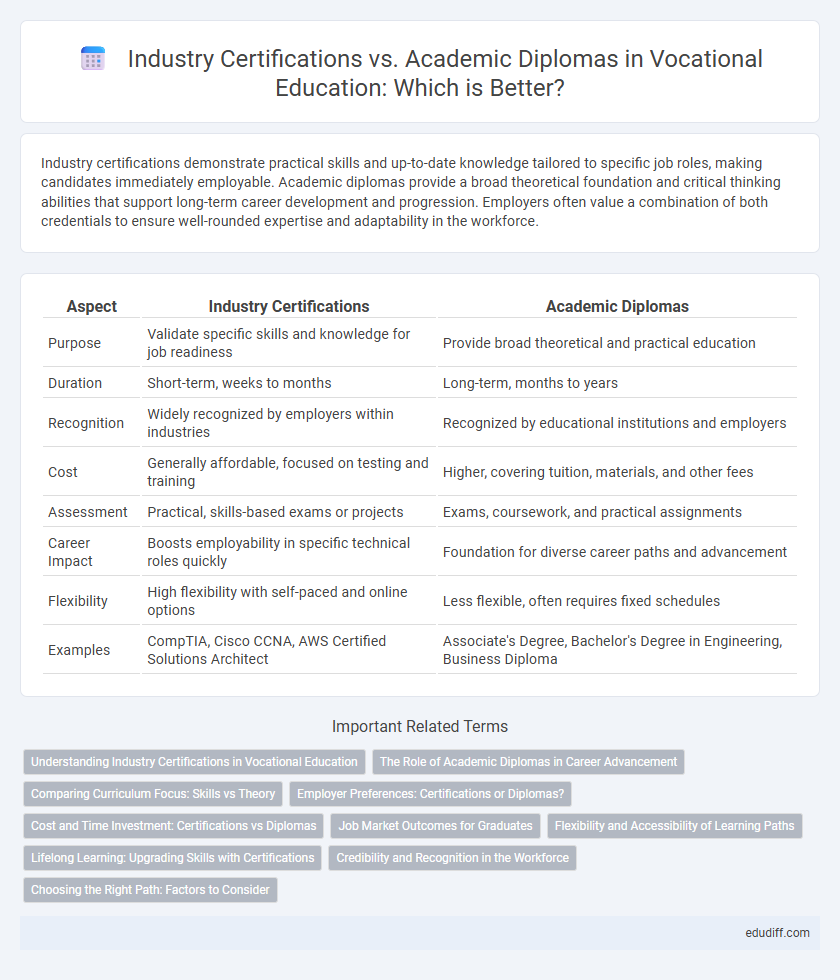Industry certifications demonstrate practical skills and up-to-date knowledge tailored to specific job roles, making candidates immediately employable. Academic diplomas provide a broad theoretical foundation and critical thinking abilities that support long-term career development and progression. Employers often value a combination of both credentials to ensure well-rounded expertise and adaptability in the workforce.
Table of Comparison
| Aspect | Industry Certifications | Academic Diplomas |
|---|---|---|
| Purpose | Validate specific skills and knowledge for job readiness | Provide broad theoretical and practical education |
| Duration | Short-term, weeks to months | Long-term, months to years |
| Recognition | Widely recognized by employers within industries | Recognized by educational institutions and employers |
| Cost | Generally affordable, focused on testing and training | Higher, covering tuition, materials, and other fees |
| Assessment | Practical, skills-based exams or projects | Exams, coursework, and practical assignments |
| Career Impact | Boosts employability in specific technical roles quickly | Foundation for diverse career paths and advancement |
| Flexibility | High flexibility with self-paced and online options | Less flexible, often requires fixed schedules |
| Examples | CompTIA, Cisco CCNA, AWS Certified Solutions Architect | Associate's Degree, Bachelor's Degree in Engineering, Business Diploma |
Understanding Industry Certifications in Vocational Education
Industry certifications in vocational education validate practical skills and technical competencies directly relevant to specific job roles, enhancing employability in rapidly evolving sectors like healthcare, IT, and manufacturing. Unlike academic diplomas, which emphasize theoretical knowledge and broad educational foundations, industry certifications focus on current industry standards and hands-on proficiency, often issued by recognized professional organizations or trade bodies. Earning these certifications demonstrates a candidate's readiness to meet workplace demands and can lead to higher wage potential and career advancement opportunities.
The Role of Academic Diplomas in Career Advancement
Academic diplomas serve as foundational credentials that validate theoretical knowledge and critical thinking skills essential for career advancement in many industries. They often act as prerequisites for higher-level positions and provide a structured learning framework that complements practical experience gained through vocational training. Employers value diplomas for their role in demonstrating a candidate's commitment, discipline, and capacity to grasp complex concepts necessary for long-term professional growth.
Comparing Curriculum Focus: Skills vs Theory
Industry certifications emphasize practical skills and hands-on experience tailored to specific job functions, ensuring immediate applicability in the workplace. Academic diplomas prioritize theoretical knowledge and broad conceptual understanding, providing a foundation for critical thinking and long-term career development. This distinction in curriculum focus influences the readiness and adaptability of graduates to meet industry demands.
Employer Preferences: Certifications or Diplomas?
Employers increasingly favor industry certifications for their demonstration of specific, job-ready skills and up-to-date knowledge aligned with current market demands. Academic diplomas provide foundational theory and broader educational background but may lack the practical application emphasized in certifications. Hiring managers often prioritize candidates with certifications in fast-evolving sectors such as IT, healthcare, and manufacturing, where validated competencies directly translate to workplace performance.
Cost and Time Investment: Certifications vs Diplomas
Industry certifications typically require lower financial investment and shorter completion times compared to academic diplomas, making them a cost-effective option for rapid skill acquisition. Certifications often focus on specific competencies relevant to vocational fields, enabling quicker entry or advancement in the workforce. Academic diplomas generally involve higher tuition fees and longer study periods, reflecting broader theoretical knowledge and comprehensive education.
Job Market Outcomes for Graduates
Industry certifications demonstrate specialized skills and practical knowledge that align with current job market demands, often leading to faster employment and higher starting salaries for graduates. Academic diplomas provide a broad educational foundation and critical thinking abilities, which can offer long-term career growth and opportunities for advanced roles. Employers increasingly value certifications for immediate job readiness while recognizing diplomas for comprehensive expertise, making a combination of both ideal for optimal job market outcomes.
Flexibility and Accessibility of Learning Paths
Industry certifications offer greater flexibility and accessibility by allowing learners to acquire specific skills through shorter, targeted programs that can be completed online or part-time. Academic diplomas typically require longer, fixed-duration commitments with rigid schedules, making them less adaptable for working professionals or those with limited time. This flexibility of industry certifications supports continuous skill development aligned with evolving vocational demands.
Lifelong Learning: Upgrading Skills with Certifications
Industry certifications offer targeted skill validation that aligns with current job market demands, enabling professionals to rapidly update their expertise in fields like IT, healthcare, and manufacturing. Unlike academic diplomas, which provide broad theoretical knowledge over extended periods, certifications focus on practical, up-to-date competencies crucial for lifelong learning and career advancement. Employers increasingly value certifications for their role in continuous professional development and adapting to evolving industry standards.
Credibility and Recognition in the Workforce
Industry certifications offer targeted, up-to-date skills validated by employers, enhancing job readiness and practical expertise. Academic diplomas provide comprehensive theoretical knowledge and broader educational foundation that employers recognize for long-term career development. Workforce credibility often favors certifications for specific roles, while diplomas hold value for positions requiring formal education credentials.
Choosing the Right Path: Factors to Consider
Industry certifications validate specific skills and practical expertise demanded by employers, offering quicker entry into the workforce and alignment with current market needs. Academic diplomas provide a broad theoretical foundation and comprehensive education, supporting long-term career development and opportunities for advancement. Choosing the right path depends on career goals, industry requirements, time commitment, and the value placed on hands-on skills versus theoretical knowledge.
Industry certifications vs Academic diplomas Infographic

 edudiff.com
edudiff.com